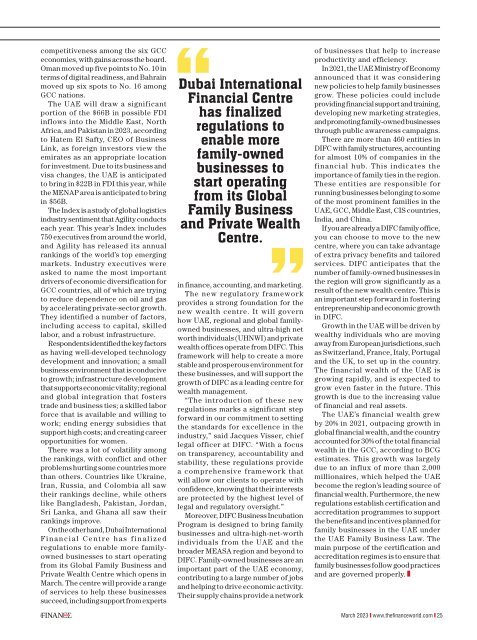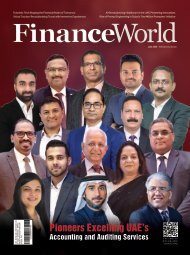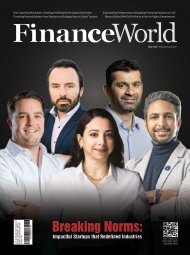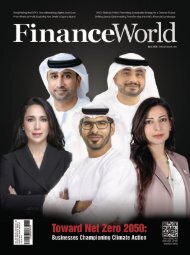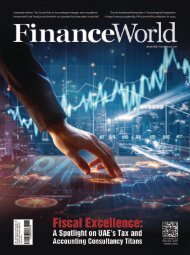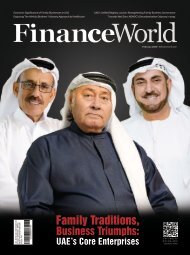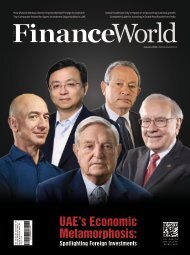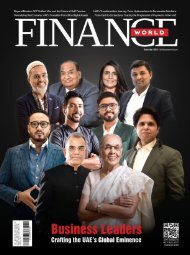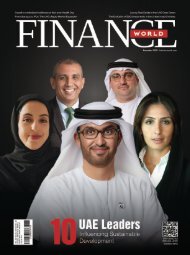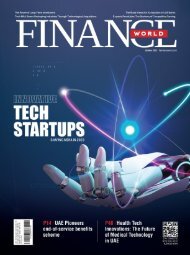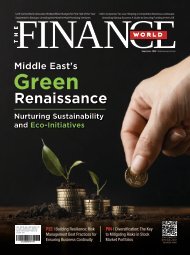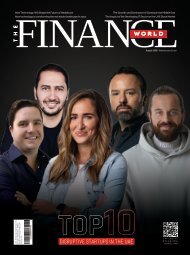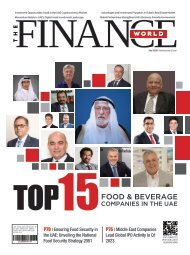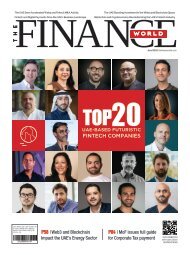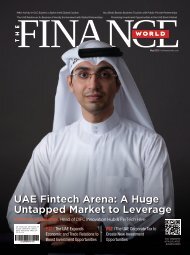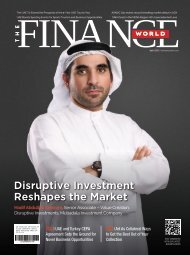The Finance World Magazine| Edition: March 2023
The March edition of The Finance World Magazine (TFW) delves into the Zayed Ambition 2 project, which strives to investigate the feasibility of leveraging the UAE's burgeoning space economy for sustainable development. This initiative showcases the country's commitment to diversifying its economy and reducing its reliance on oil. In a featured interview, CEO Shaaista Khan Osman and Managing Director Osman Osman of Blu Blood share their insights about the event management industry in the UAE. This issue also includes insights from Sridhar Vembu, CEO of Zoho Corporation, on emerging AI tools, along with some advice for SMEs and startups. Through this edition, we also bring you insights on topics like the UAE's steadfast dedication to sustainable growth and development, Dubai surpassing global and regional tourism recovery levels, the sports industry emerging as a promising sector magnetizing international investors, and many more key informational articles in the finance sector. Keep yourself up to date with all financial sector news with our current news segments. Each person can find something unique from us. We believe our readers deserve real value from what we have to offer.
The March edition of The Finance World Magazine (TFW) delves into the Zayed Ambition 2 project, which strives to investigate the feasibility of leveraging the UAE's burgeoning space economy for sustainable development. This initiative showcases the country's commitment to diversifying its economy and reducing its reliance on oil.
In a featured interview, CEO Shaaista Khan Osman and Managing Director Osman Osman of Blu Blood share their insights about the event management industry in the UAE. This issue also includes insights from Sridhar Vembu, CEO of Zoho Corporation, on emerging AI tools, along with some advice for SMEs and startups.
Through this edition, we also bring you insights on topics like the UAE's steadfast dedication to sustainable growth and development, Dubai surpassing global and regional tourism recovery levels, the sports industry emerging as a promising sector magnetizing international investors, and many more key informational articles in the finance sector.
Keep yourself up to date with all financial sector news with our current news segments. Each person can find something unique from us. We believe our readers deserve real value from what we have to offer.
You also want an ePaper? Increase the reach of your titles
YUMPU automatically turns print PDFs into web optimized ePapers that Google loves.
competitiveness among the six GCC<br />
economies, with gains across the board.<br />
Oman moved up five points to No. 10 in<br />
terms of digital readiness, and Bahrain<br />
moved up six spots to No. 16 among<br />
GCC nations.<br />
<strong>The</strong> UAE will draw a significant<br />
portion of the $66B in possible FDI<br />
inflows into the Middle East, North<br />
Africa, and Pakistan in <strong>2023</strong>, according<br />
to Hatem El Safty, CEO of Business<br />
Link, as foreign investors view the<br />
emirates as an appropriate location<br />
for investment. Due to its business and<br />
visa changes, the UAE is anticipated<br />
to bring in $22B in FDI this year, while<br />
the MENAP area is anticipated to bring<br />
in $56B.<br />
<strong>The</strong> Index is a study of global logistics<br />
industry sentiment that Agility conducts<br />
each year. This year’s Index includes<br />
750 executives from around the world,<br />
and Agility has released its annual<br />
rankings of the world’s top emerging<br />
markets. Industry executives were<br />
asked to name the most important<br />
drivers of economic diversification for<br />
GCC countries, all of which are trying<br />
to reduce dependence on oil and gas<br />
by accelerating private-sector growth.<br />
<strong>The</strong>y identified a number of factors,<br />
including access to capital, skilled<br />
labor, and a robust infrastructure.<br />
Respondents identified the key factors<br />
as having well-developed technology<br />
development and innovation; a small<br />
business environment that is conducive<br />
to growth; infrastructure development<br />
that supports economic vitality; regional<br />
and global integration that fosters<br />
trade and business ties; a skilled labor<br />
force that is available and willing to<br />
work; ending energy subsidies that<br />
support high costs; and creating career<br />
opportunities for women.<br />
<strong>The</strong>re was a lot of volatility among<br />
the rankings, with conflict and other<br />
problems hurting some countries more<br />
than others. Countries like Ukraine,<br />
Iran, Russia, and Colombia all saw<br />
their rankings decline, while others<br />
like Bangladesh, Pakistan, Jordan,<br />
Sri Lanka, and Ghana all saw their<br />
rankings improve.<br />
On the other hand, Dubai International<br />
Financial Centre has finalized<br />
regulations to enable more familyowned<br />
businesses to start operating<br />
from its Global Family Business and<br />
Private Wealth Centre which opens in<br />
<strong>March</strong>. <strong>The</strong> centre will provide a range<br />
of services to help these businesses<br />
succeed, including support from experts<br />
Dubai International<br />
Financial Centre<br />
has finalized<br />
regulations to<br />
enable more<br />
family-owned<br />
businesses to<br />
start operating<br />
from its Global<br />
Family Business<br />
and Private Wealth<br />
Centre.<br />
in finance, accounting, and marketing.<br />
<strong>The</strong> new regulatory framework<br />
provides a strong foundation for the<br />
new wealth centre. It will govern<br />
how UAE, regional and global familyowned<br />
businesses, and ultra-high net<br />
worth individuals (UHNWI) and private<br />
wealth offices operate from DIFC. This<br />
framework will help to create a more<br />
stable and prosperous environment for<br />
these businesses, and will support the<br />
growth of DIFC as a leading centre for<br />
wealth management.<br />
“<strong>The</strong> introduction of these new<br />
regulations marks a significant step<br />
forward in our commitment to setting<br />
the standards for excellence in the<br />
industry,” said Jacques Visser, chief<br />
legal officer at DIFC. “With a focus<br />
on transparency, accountability and<br />
stability, these regulations provide<br />
a comprehensive framework that<br />
will allow our clients to operate with<br />
confidence, knowing that their interests<br />
are protected by the highest level of<br />
legal and regulatory oversight.”<br />
Moreover, DIFC Business Incubation<br />
Program is designed to bring family<br />
businesses and ultra-high-net-worth<br />
individuals from the UAE and the<br />
broader MEASA region and beyond to<br />
DIFC. Family-owned businesses are an<br />
important part of the UAE economy,<br />
contributing to a large number of jobs<br />
and helping to drive economic activity.<br />
<strong>The</strong>ir supply chains provide a network<br />
of businesses that help to increase<br />
productivity and efficiency.<br />
In 2021, the UAE Ministry of Economy<br />
announced that it was considering<br />
new policies to help family businesses<br />
grow. <strong>The</strong>se policies could include<br />
providing financial support and training,<br />
developing new marketing strategies,<br />
and promoting family-owned businesses<br />
through public awareness campaigns.<br />
<strong>The</strong>re are more than 460 entities in<br />
DIFC with family structures, accounting<br />
for almost 10% of companies in the<br />
financial hub. This indicates the<br />
importance of family ties in the region.<br />
<strong>The</strong>se entities are responsible for<br />
running businesses belonging to some<br />
of the most prominent families in the<br />
UAE, GCC, Middle East, CIS countries,<br />
India, and China.<br />
If you are already a DIFC family office,<br />
you can choose to move to the new<br />
centre, where you can take advantage<br />
of extra privacy benefits and tailored<br />
services. DIFC anticipates that the<br />
number of family-owned businesses in<br />
the region will grow significantly as a<br />
result of the new wealth centre. This is<br />
an important step forward in fostering<br />
entrepreneurship and economic growth<br />
in DIFC.<br />
Growth in the UAE will be driven by<br />
wealthy individuals who are moving<br />
away from European jurisdictions, such<br />
as Switzerland, France, Italy, Portugal<br />
and the UK, to set up in the country.<br />
<strong>The</strong> financial wealth of the UAE is<br />
growing rapidly, and is expected to<br />
grow even faster in the future. This<br />
growth is due to the increasing value<br />
of financial and real assets.<br />
<strong>The</strong> UAE’s financial wealth grew<br />
by 20% in 2021, outpacing growth in<br />
global financial wealth, and the country<br />
accounted for 30% of the total financial<br />
wealth in the GCC, according to BCG<br />
estimates. This growth was largely<br />
due to an influx of more than 2,000<br />
millionaires, which helped the UAE<br />
become the region’s leading source of<br />
financial wealth. Furthermore, the new<br />
regulations establish certification and<br />
accreditation programmes to support<br />
the benefits and incentives planned for<br />
family businesses in the UAE under<br />
the UAE Family Business Law. <strong>The</strong><br />
main purpose of the certification and<br />
accreditation regimes is to ensure that<br />
family businesses follow good practices<br />
and are governed properly.<br />
<strong>March</strong> <strong>2023</strong> www.thefinanceworld.com 25


